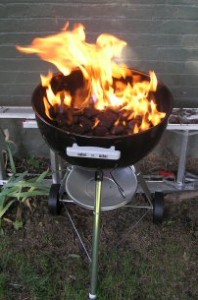It’s grilling season! All ravenous meat-eating enthusiasm aside for a moment, it’s important to remember to think about some of the finer points of keeping safe during this summer’s outdoor cooking-fest. I’m not talking about overloading your turkey fryer and burning down your house. We’ll hold that type of advice for my holiday cooking post. Today is about keeping your food safe, and properly cooked and stored while you grill.
There is nothing wrong with going over a few reminders on how to protect yourselves and your guests. Try to follow some simple steps developed by the American Dietetic association in their Home Food Safety program and you’ll be safer and happier with your BBQs. The program is dedicated to raising consumer awareness about the seriousness of foodborne illness and providing solutions for easily and safely handling food… How can you argue with that?
This summer and beyond, play it safe by following four simple rules:
1. Wash your hands often.
2. Keep raw meats and ready-to-eat foods separate.
3. Cook to proper temperatures.
4. Refrigerate promptly to 40 degrees Fahrenheit or below.
Beyond the basics, there are some other good things to keep in mind. Here are just a few to keep your food healthy and delicious!
Soap up the BBQ. Be sure to scrub the grill, outdoor utensils, coolers and other containers with hot soapy water before cooking or packing up your favorite summertime treats.
Remember the kitchen sink. Your backyard can become an additional room in your house during the summer months with everything but…the kitchen sink. Devise a plan ahead of time so you are able to wash your hands before, during and after handling foods outside. The best way to wash your hands is in warm, soapy water for at least 20 seconds. Keep a bottle of hand sanitizer near your grill or pack moist towelettes in your cooler for those moments when soap and water are not readily available.
Dishtowel disaster. A man with an apron on and a dishtowel thrown over his shoulder is often the image of grilling expertise but there is definitely a barbecue blunder in this picture. Using the same dishtowel over and over to wipe your hands and clean up spills at the grill can spread harmful bacteria. Stick to paper towels or wipes to clean up spills and save the dishtowels for drying clean dishes and hands.
Separate treats for backyard feasts. Cross-contamination tops the list of food safety concerns during the outdoor grilling season. Keep raw meats and ready-to-eat foods separate. Pack extra plates and utensils to handle raw foods and another set for cooked foods, to prevent cross-contamination. Wash utensils in warm, soapy water between uses.
Baste for taste. The same rule of separation also applies when marinating meats. Using the same brush to baste both raw and cooked meats is a potentially dangerous pitfall. Always use a separate or just-washed brush to marinate raw and cooked meats, and remember to boil any leftover marinade before using it to season cooked meats.
The summer tool of choice: a food thermometer. Forget the lawnmower or Weedwacker and make a food thermometer your go-to tool this summer. Relying on color alone or waiting for the juices to run clear to ensure the doneness of meat is a common barbecue blunder. A food thermometer is the only way to ensure food has been cooked to the proper temperature. Favorites like steak should be cooked to at least 145° F and hamburgers should be cooked to at least 160° F, while chicken should be cooked to at least 165° F.
Keep it cool. Stock coolers with plenty of ice and/or ice packs to keep foods at temperatures below 40 degrees F. Put a refrigerator thermometer in your cooler to make sure foods are stored at proper temperatures. Transport foods in the air-conditioned back seat of your car instead of the hot trunk. Once at your outdoor dining destination, try to keep foods in the shade and out to of direct sunlight.
Remember the two (one) hour rule. As temperatures go up, the amount of time perishable foods can remain out of refrigeration goes down. While foods typically follow the two-hour rule, in hot weather (90 degrees F or above) this time is cut in half to one hour. At your next outdoor event, remember to keep foods on ice: fill a kiddy pool or over-sized cooler with ice and drop in sealed containers of favorites such as potato salad and dips. Consider setting a kitchen timer or the alarm on your cell phone to remind you when food should be refrigerated. Also keep a refrigerator thermometer on hand to make sure foods stay chilled below 40 degrees F.
Stay safe out there!
-bryan
A downloadable chart of safe minimum internal temperatures for all your barbecue and picnic favorites can be found at www.homefoodsafety.org, along with more tips on how to remain the king of your barbecue domain.






Leave A Comment